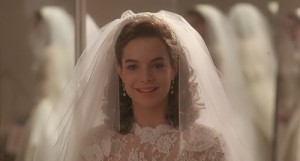In the 1991 film Father of the Bride, the bride falls into a day-long funk after what had ostensibly been weeks of joyful wedding planning. The father, played by Steve Martin, eventually discovered that his future son-in-law had given his daughter a blender as a wedding gift. Being the educated, professional woman that she was, Martin’s daughter believed her gift to be an indication of her husband’s expectations in marriage. Days of smoothie-making and reveling in a series of gifted home appliances to show off to her friends awaited her, she thought. It all turned out to be a misunderstanding because the daughter really liked to make smoothies, and from a certain perspective, the gift was pretty progressive since the Blended Fruit Smoothie was a modern snack in the early nineties.
To the onlooker, a bride can seem jumpy when she’s in the midst of wedding planning. It could be pre-wedding jitters or ego-inflating vanity.
Refinery29, a modern women’s magazine, attributes a bride’s anxiety to:
“Bickering relatives, flaky friends, money woes, and the general stress that comes with throwing a matrimonial shindig”.
Any of these nonspecific explanations gives us free reign to use the term “bridezilla”, which is a portemanteau for any future bride that has an opinion or reaction about her upcoming wedding. When Martin’s daughter and wife kicked and screamed for outrageous wedding details, he could not deflect the reams of estrogen hurling towards him. Leaving his wallet open and a staying calm were his survival tactics.
I’m planning my own wedding this year, and I feel that none of these descriptions fit me, even though I’ve had a few stressful moments. Certainly, I’m neither insecure about the act of marriage nor do I see the wedding as a glorified Tina-fest. I love my family and friends and am comfortable with my budget and planning process. The only other explanation that Refinery29 gives is ‘general stress’. What is it? What gives?
A convincing explanation could be that planning a wedding simply adds to the already unequal balance of housework that women have to do in a typical relationship. A 2005 study, published in Qualitative Sociology, found that for some couples, wedding planning tasks are unfairly pushed onto the female, positing that the process is a form of “unpaid and unappreciated women’s work”, like housework. Planning a huge celebration, like a wedding, is just another task to jot down on a woman’s to-do-list.
The author, Tamara Sniezek, conducted a series of interviews with a variety of heterosexual couples to find out how housework is divided between the pair. Then, Sniezek asked them to explain how they regard the division of work. The interview data is summarized in the paper.
Women have always and still perform more than half of her household’s chores, with 17 hours per week done by women and six by men, on average. Does this hold true for your relationship?
A subset of couples exacerbate the power imbalance that is related to unequally sharing in the wedding planning tasks, researchers have found. For those couples that had differing views of male and female roles in society, the wedding planning process became a display of hegemonic labor structure.
The three researchers interviewed 21 heterosexual newlyweds about how they view gender roles, perceive gender on display and evaluate gender. Among the 21 couples, six were traditional, 10 were transitional, and five were egalitarian. The transitional couples, those pairs in which the man and woman evaluated gender differently, developed wedding planning units that saw one person dominating the other.
I suppose that the ‘general stress’ of wedding planning then comes from the power struggle between the bride and groom that arises from dissimilar gender ideologies. The fiancés may just misunderstand what exactly the other person is happy doing. Honestly, not all women think it’s fair that they should organize the entire celebration. Just because women are social beings, and it’s a social event, it doesn’t mean that guys are giving their gals the greatest gift of lovely. Maybe they should make a movie about that.
(Some women do think it’s ok, though. In fact, there’s a whole genre of women’s blogs that celebrate home life and womanhood, like life of a wife. It startles me, as a 20-something Millennial, that other women in my generation actually stay at home, make crafts and plan that evening’s supper for their husbands all day. It’s fine to choose to do that later on in life, I guess, but I didn’t know that was still an occupation to aspire to right out of college. I’m just saying.)
Papers cited in this post:
Sniezek T. (2005). Is It Our Day or the Bride’s Day? The Division of Wedding Labor and Its Meaning for Couples,
Qualitative Sociology, 28 (3) 215-234. DOI:
10.1007/s11133-005-6368-7Humble A.M., Zvonkovic A.M. & Walker A.J. (2007). “The Royal We”: Gender Ideology, Display, and Assessment in Wedding Work, Journal of Family Issues, 29 (1) 3-25. DOI: 10.1177/0192513X07305900




